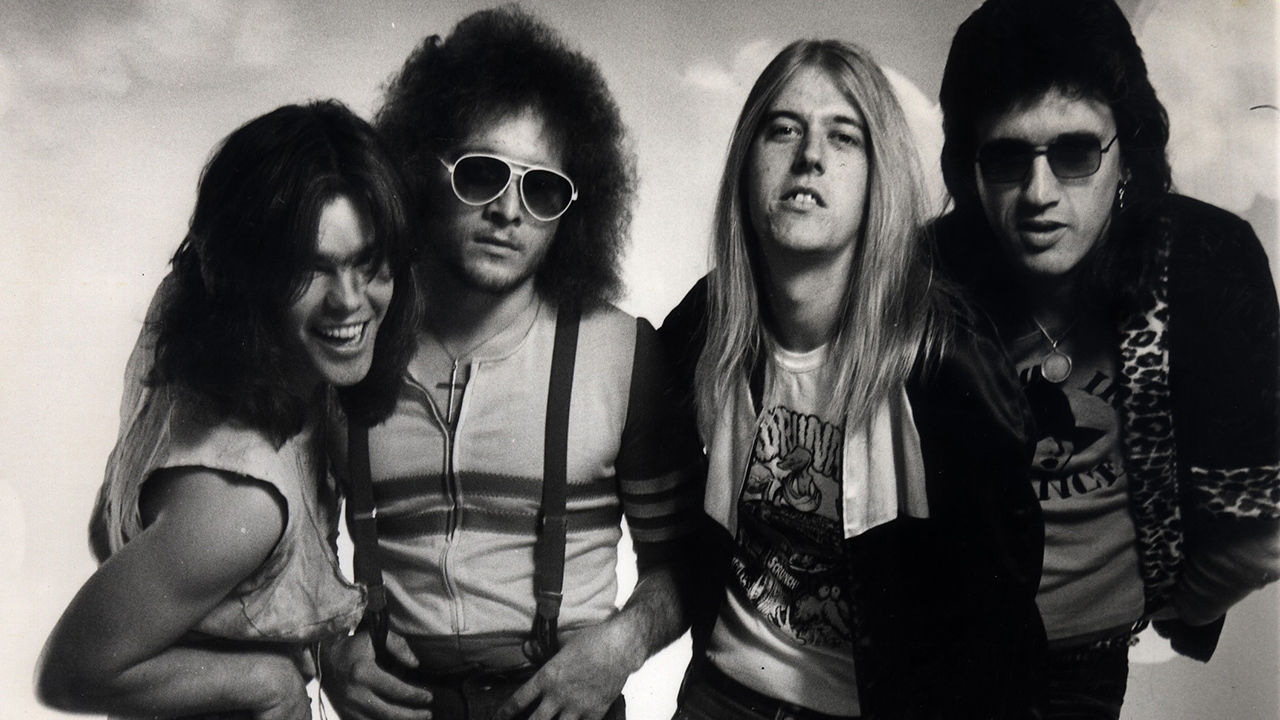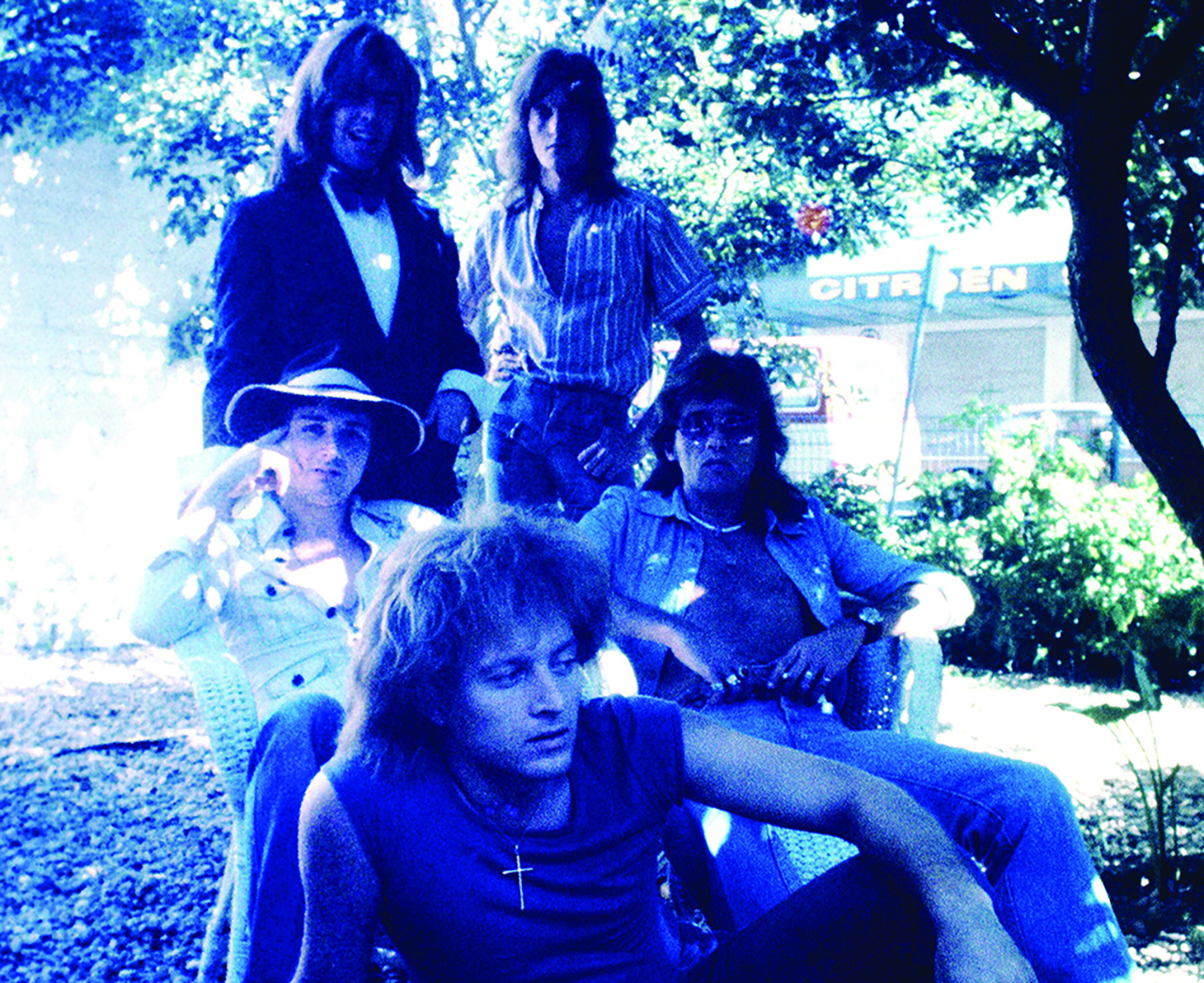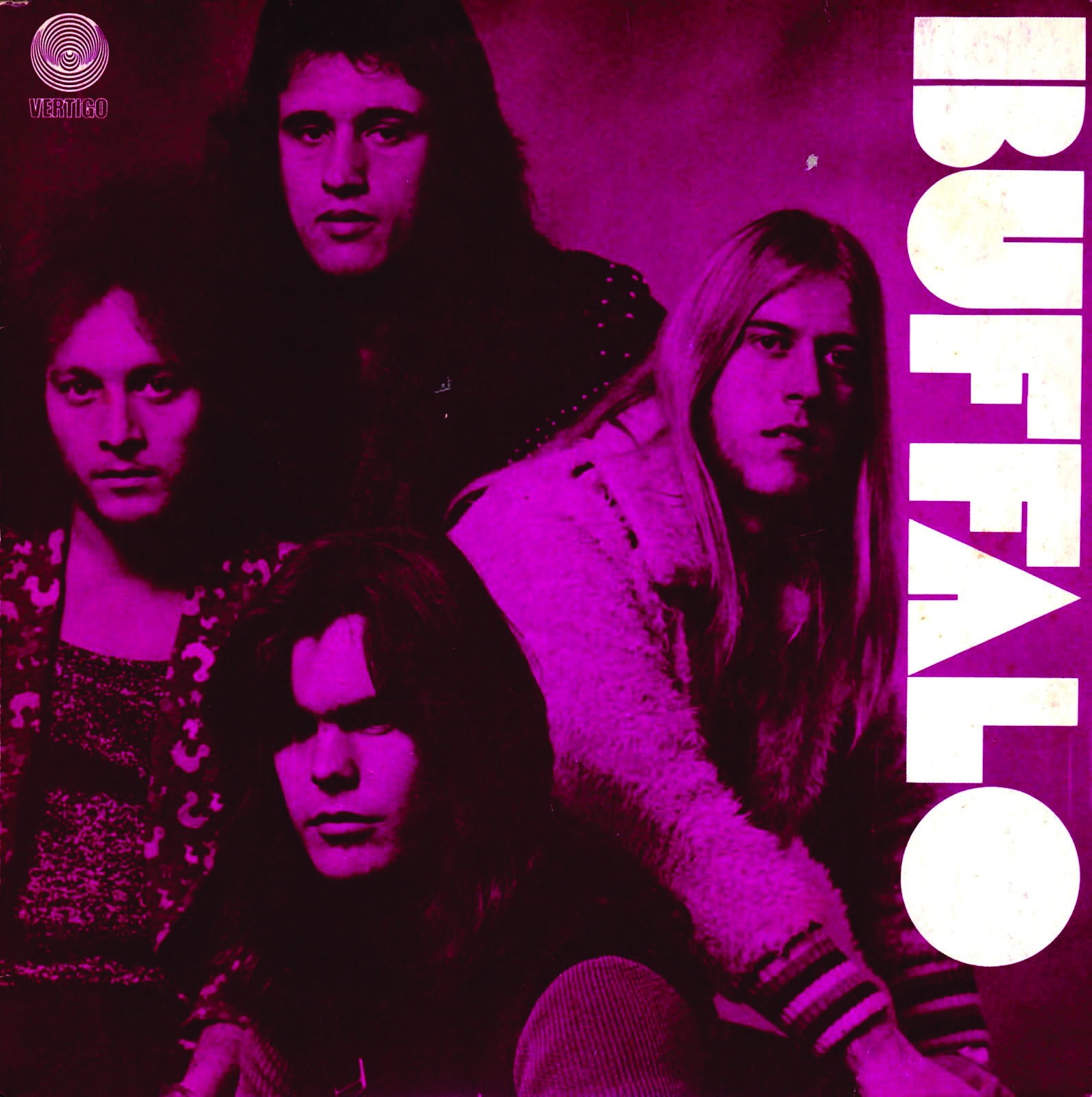Were Buffalo the original Aussie heavy metal band?
Forget AC/DC and Rose Tattoo – Brisbane bruisers Buffalo brought heavy rock Down Under

The cover of Buffalo’s third album, Only Want You For Your Body, depicts an obese middle-aged woman tethered to a torture rack. Her filthy floral dress is hiked up around her armpits, exposing her belly, black panties and baggy stockings. She’s writhing and screaming in pain as the rack stretches her torso to breaking point.
Flip the cover over and you’ll find a photo of Dave Tice, Buffalo frontman, garbed in a nifty off-the-shoulder leather fetish jumpsuit. He’s standing on the now mysteriously empty torture rack, cradling a bullwhip and grinning lasciviously.
“Was the woman on the album cover an acquaintance of ours?” chuckles Buffalo guitarist John Baxter. “No. When we tortured people we made sure we didn’t know them.”
“We set out intentionally and unashamedly to shock,” states drummer Jimmy Economou. “I agree this may have hampered our success but that was the very essence of Buffalo.”
Welcome to the politically incorrect 1970s world of primal Australian heavyweights Buffalo. The band who made AC/DC sound like The Seekers. The band who blew Black Sabbath offstage. The band whom Ritchie Blackmore tried to sabotage. The band whose defining anthem was, and remains, I’m A Skirt Lifter, Not A Shirt Raiser. The best band you’ve probably never heard of…
It could have all turned out so differently if Buffalo had called themselves Balladong, Bundanoon or Burrumbuttock. Dave Tice and bassist Pete Wells had formed the band in Brisbane in 1969 under the name Head, but the sexual connotations and association with the burgeoning drug culture caused problems with booking agents.
“One agent who was prepared to take us on insisted we needed a name change and assured us that monikers beginning with ‘B’ – Beatles, Beach Boys – were set fair for success,” says Tice. “Our response was to stick a pin in a map of Australia and take the first name beginning with ‘B’. Luckily Buffalo [a town in Victoria] seemed to make some sense for a band doing pretty heavy material.”
Sign up below to get the latest from Classic Rock, plus exclusive special offers, direct to your inbox!
Tice had been born in Catford, South London, before emigrating to Australia with his family when he was 13. On their arrival in Queensland, they were billeted in a migrant hostel while Tice’s father looked for work. “A bunch of us hostel boys got the idea that we might form a band,” he says. “It looked like fun and the girls seemed to like musicians, so we talked our folks into buying us instruments and started banging away in the hostel youth centre.”
Wells joined the jam session via an ad in a local paper. “He was streets ahead of the rest of us and he had an aura of experience,” says the singer. “Over the next three years or so Pete and I played together in a number of local bands. He was like my big brother. We shared a love of blues music and a burning desire to succeed in the music business.”

Head came about after the pair grew disenchanted with Brisbane’s music scene. “We’d had enough of having to play pop songs in order to work,” says Tice, “and we’d also had enough of the two agents that controlled everything there. These guys were basically petty criminals who used up their acts and rarely paid what they owed. We wanted to play blues-based material and it wasn’t a viable option in Brisbane. Even less of an option was to play original songs.”
A move to Sydney failed to get them noticed. “We might as well have been invisible,” chuckles Tice. “No agent was interested in a bunch of hicks from Brisbane, so we found jobs and checked into a fleapit hotel in Kings Cross while we waited for our big break.”
Things began to look brighter when they fired their original guitarist and recruited John Baxter. “We all met in the basement of a house in Darlinghurst,” says Tice. “We quickly discovered that John had no knowledge of, or feeling for, the blues, but he was certainly unique in his style. After the audition, Pete and I retired outside for a smoke and a chat. Pete said: ‘He can’t play blues but there’s something kinda interesting going on here. Let’s give it a go.’”
“John Baxter was one of the best,” asserts Jimmy Economou. “He became the heart and soul of Buffalo, like Angus to AC/DC.”
The newly rechristened Buffalo’s debut album, Dead Forever…, emerged in June 1972 via Phonogram Records’ Vertigo imprint. It was Vertigo’s first release by a non-British and non-European artist. However, it was inexplicably ignored by the label’s UK arm – a baffling decision, and one that goes a long way to explaining Buffalo’s largely unknown status over here.
Besides Tice, Wells and Baxter, Dead Forever… featured drummer Paul Balbi and a second singer, Alan Milano. “It seemed like a reasonable idea at first, but as time went on, we decided a one-singer format was more for us,” says Baxter.
Dead Forever… is arguably the first Australian heavy metal album. More than 40 years down the line, its primordial potency still shines through. Suzie Sunshine, Ballad Of Irving Fink and the title track have hooks so sharp they could snare a shiver of tiger sharks; Forest Rain is a giant-sized, big-lunged ballad full of thunder and lightning; the simmering Bean Stew showcases Baxter’s freakout fretwork to astonishing effect; while standout track I’m A Mover reimagines the stalking Free chestnut as Black Sabbath’s Warning. Indeed, the guitarist’s earth-trembling approach recalls Tony Iommi, as well as Blue Cheer’s Leigh Stephens and even Mick Bolton during UFO’s fledgling psychedelic period.
“I must have been one of the first guitarists in Sydney to own a hundred-watt amp,” Baxter says proudly. “I always liked it loud. If a promoter ever asked Buffalo to turn it down, he was about to have a battle on his hands. We walked out of gigs because of this. No one tells a rampaging Buffalo herd to turn it down!”
In 1973, Buffalo supported Black Sabbath in Sydney during the latter’s very first tour Down Under. On the surface, it seemed a fitting match, especially given that music journalists at home often acclaimed Buffalo as Australia’s answer to Sabbath. Neither Baxter nor Tice is comfortable with the comparison.
“Not accurate!” exclaims Baxter. “I don’t think we’re too similar at all. It was more like we were an answer to 70s British rock in general. Some people, so it’s said, thought we were better on the night than Sabbath. Yes, I know – hard to believe.”
“I don’t see any validity in comparing us to Sabbath,” echoes Tice. “When we were released on Vertigo, it was probably because the powers that be were aware of Sabbath and thought we might be an Aussie version. But we had established our style long before we ever knew or heard of Sabbath.”
Unwanted comparisons aside, Buffalo’s approach was groundbreaking in the context of Australia’s virtually non-existent rock scene. “We didn’t see ourselves as pioneers,” insists Baxter. “We just got on with rockin’ things up, chasing gigs and all.”
AC/DC didn’t register on Buffalo’s radar, either. “I wasn’t really aware of AC/DC through most of my time in Buffalo,” Tice admits. “I have no regrets or jealousy about their success. I was pleased to see such a quintessentially Australian band do so well. It was no real surprise because they were much more commercial-sounding than us.”
Buffalo’s second album, Volcanic Rock, came out in August 1973, with Jimmy Economou replacing Paul Balbi on drums. “Volcanic Rock is where we really crystallised our sound and direction,” says Tice. “The line‑up was stable and we had a lot of gigs under our belts, so we were tight and focused. We were all on top of our game.”
And then some. Opening track Sunrise (Come My Way) balances Tice’s gnawing holler with Baxter’s six-string savagery, all wrapped up in a pro-environment/anti-war message; The Prophet takes the tale of Moses and turns it into a biblical horror story; the feral Pound Of Flesh gives way to the sinister Shylock, Tice demanding: ‘Pay me now! Pay me now!’ Hell, wonga.com has got nothing on this guy.
Volcanic Rock came in a controversial cover: a graphic depiction of a volcano shaped like a female torso and menstruating molten lava. An androgynous, flame-haired demon stands on top of the volcano, holding up a phallus-shaped rock.
“We weren’t being played on radio and we needed our albums to stand out in the record shops,” says Baxter. “I just wish that Volcanic Rock featured a burning guitar above the creature’s head. The artist must’ve thought we were a bunch of chauvinists. He might’ve been right.”
Buffalo’s OTT album sleeves and bullish personas were catnip to Australian music journalists hungry for talking points. “The music press was only interested in writing anything if it was outrageous and seen as antisocial behaviour on our part,” says Tice. “We took full advantage of this. Our management would send trumped-up stories of debauched parties et cetera, which the press printed with glee. They’d ask things like: ‘Would you allow your daughter to date these guys?’ Perhaps parents wouldn’t like it if they did, but the truth is their daughters were anyway!”

Buffalo had less luck with Australia’s TV and radio stations, who weren’t inclined towards hard rock or heavy metal. The only feasible outlet was the pop show Countdown, Australia’s answer to Top Of The Pops, which John Baxter describes as “rather plastic and glam”. In any case, they managed to scupper their chances of appearing when the guitarist insulted the host of the show, Molly Meldrum.
“We were in Melbourne, playing support to Slade,” says Baxter. “We had a press conference and Molly showed up. I was tanked. I staggered over to him and said: ‘How ya goin’ Molly – you’re a bit of a poofter, ain’t ya?’ Pretty stupid really. To make it in Australia back then you had to go on Countdown. But we didn’t like the show much, so we didn’t care.”
For Dave Tice, that sort of behaviour was exactly what being in a rock’n’roll band was all about. “Our aim was to be the loudest, maddest band around – and get the most girls,” he says. “It was a point of pride that we were considered outsiders by the mainstream of Australian music media. We were a pretty arrogant bunch, which I suppose is one of the prerequisites of being in a rock band.”
For their third album, Buffalo ramped up the controversy even further. Released in June 1974, Only Want You For Your Body featured that notorious overweight-lady-on-a‑torture-rack cover. More sensitive souls might also have taken offence at a track titled I’m A Skirt Lifter, Not A Shirt Raiser. “[Producer] Spencer Lee was a funny guy,” says Dave Tice. “He brought a young lady into the studio and had me tickling her in front of the mic so we could get the sound of her giggling at the end of the song. Must say I enjoyed that.”
Faster-paced and more focused than its predecessors, Only Want You For Your Body found Buffalo rejoicing in their role as lascivious Aussie yob-rockers, cranking out hulking, ominous riff‑rock like their lives depended on it. The stomping I’m A Skirt Lifter recalls Brian Johnson’s pre-AC/DC band Geordie and is every bit as salacious as its title suggests.
Kings Cross Ladies follows in much the same pattern: a pounding paean to the doyennes of Sydney’s red‑light district (‘All the ladies they are only half your age/Take them out and you will make the front page.’)
But it isn’t all overarching machismo. There’s a triumphant cover of Alvin Lee’s I’m Coming On, while Dune Messiah (inspired by the Frank Herbert sci-fi novel) and Stay With Me have the same demented vibe that permeates the songs on Sabbath’s Sabotage. On closing track United Nations, Buffalo return to earthy basics, Tice railing against that organisation’s ineffectiveness: ‘Got your United Nations/Gonna stop confrontations/I know that you can’t/There’s been too much lying.’ At the end of the album, the band’s humour shines through as footsteps approach the mic and a twangy Australian voice simply says: “Thang-yew.”
But Only Want You For Your Body was to prove John Baxter’s final Buffalo album. Towards the end of 1974, the guitarist was surprisingly sacked.
“I was told by the manager, Sebastian Chase, that I was leaving the band,” says Baxter. “It was a total shock. He had no right – I was the originator of the Buffalo sound. Dave and I weren’t on good terms at the time. I don’t remember why. I believe Dave and the manager wanted to pursue a more commercial direction. I was wounded. I couldn’t understand why my mates would do this.”
“Management and label decided that we needed to be more commercial,” Tice confirms. “They wanted a hit pop record, and John was seen as the one least able to change his style and attitude. They called him an uncontrollable force. ‘Uncontrollable’ is probably a good way to describe the whole band really, up to this point.”
“I wasn’t happy when John was forced out of the band,” says Economou. “I felt that things would never be the same, as John’s guitar playing was the lynchpin of the band. This was the beginning of the end for Buffalo.”
They ploughed on, releasing the Baxter-less album Mother’s Choice in March 1976, but they were running out of steam. Still, they continued their hard-touring schedule, snaffling the support slot with Ritchie Blackmore’s Rainbow on their tour of Australia in November 1976.
“That wasn’t a very pleasant experience,” recalls Tice. “We were treated like unwanted guests and in most instances allowed only limited use of PA and lights. In Adelaide, Mr Blackmore actually tried to sabotage our set. Pete Wells’s bass amp power cord was mysteriously pulled out halfway through a song and then Jimmy was assaulted by pieces of backstage rubbish thrown at him while he was trying to play drums. Of course, soundchecks never happened either.”
Buffalo released their fifth album, Average Rock’N’Roller, in July 1977. “The title sums it up,” says Economou.
By time it came out, it was literally all over – the band had broken up the previous March. “Pete Wells was the first to leave,” says Tice. “He’d had enough of the commercial pressure and was also keen to explore electric slide guitar. He had the whole Rose Tattoo concept already planned out. I’d had enough of the bullshit too, and in my eyes the whole Buffalo concept had been devalued in pursuit of something I wasn’t that interested in anyway. The players who’d replaced John were all fine musicians but they didn’t have the same spirit or attitude. The very things that caused John to be ousted were the things I missed having the most.”
“How did I feel when Buffalo broke up?” asks Economou. “Relieved, but at the same time immensely sad.”

In the wake of Buffalo’s split, Dave Tice moved to London to join rowdy pub-rockers the Count Bishops before moving back to Australia in 1984, forming The Headhunters with Mick Cocks of Rose Tattoo and former AC/DC bassist Mark Evans. These days, he still plays with Evans as an acoustic duo, as well as playing shows with his own group, the Dave Tice Band.
After leaving Buffalo, John Baxter put together two bands, Southern Cross and Boy Racer, before taking an extended break from music. He decided to pick his guitar up again “about ten years ago, when a local Buffalo fan asked me: ‘Can you still write those riffs of yours any more?’ That got me thinking and off I went.” He’s currently writing and recording with “an unknown but excellent local guitarist” named Shane Hodgetts. Jimmy Economou still plays drums occasionally, as well as running his own pool and spa business. But of the four members of Buffalo’s classic line‑up, Pete Wells went on to the greatest things. Switching from bass to slide guitar, he co-founded Aussie bruisers Rose Tattoo. Sadly, he died from prostate cancer in 2006.
“Most fans these days think of Pete as the innovative slide-guitar player he became, but to me, he’ll always be the best bass player I ever worked with,” says Tice. “I’m still not over his passing.”
The singer still accepts invitations for the occasional performance under the Buffalo Revisited banner, and he looks back on the band’s original run with affection, despite their lack of success outside of their home country.
“It’s one of my regrets that we never had the chance to show the band to an international audience, but it makes me proud to know that our music is still collected and enjoyed in many parts of the world to this day,” he says. “We must have done something right.”
“Thanks to the internet and YouTube, we’ve gained a lot of new fans over the past few years,” reveals Baxter. “I find it remarkable considering how long ago our albums were recorded. But I also find it very pleasing, vindicating our refusal to give in to being manipulated by commercialism. We played the style of music that we loved and believed in, and hoped that there would be enough people who liked our music to keep us rockin’ on. Who knows… maybe, after all these years, that’s finally beginning to happen.”

Thunder Down Under: four more cult Aussie bands
SKYHOOKS
Who they were: The Melbourne band had a tongue-in-cheek glam-rock image à la The Tubes, and scored several No.1 albums and singles on the Oz charts.
What they sounded like: With their social-commentary lyrics and theatrical stage show, Skyhooks had more than a hint of the Sensational Alex Harvey Band about them.
Essential listening: Debut album Living In The 70s (1974) sold a colossal 300,000 copies in Australia. Skyhooks’ 1978 song Women In Uniform was later covered by Iron Maiden.
.
BILLY THORPE AND THE AZTECS
Who they were: Frontman Thorpe was born in Manchester before emigrating to Australia with his parents. Once a cuddly pop crooner, he grew a beard and pigtail and transformed himself into a wild ’n’ crazy rocker as the 60s turned into the 70s.
What they sounded like: Gnawing blues rock with Thorpe’s hollerin’ vocals.
Essential listening: Most People I Know Think That I’m Crazy is widely regarded as Thorpe’s signature tune.
TAMAN SHUD
Who they were: From Newcastle, New South Wales, Taman Shud featured 15-year-old guitar prodigy Tim Gaze.
What they sounded like: A trailblazing but at times baffling combination of psych, prog and surf rock.
Essential listening: Goolutionites And The Real People (1970) is worth getting for the title alone.
BLACKFEATHER
Who they were: Formed in Sydney in 1970, Blackfeather had more line-up changes than Deep Purple and Rainbow combined. The one constant was lead singer Neale Johns.
What they sounded like: Guitar-powered psychedelic blues rock, so convincing you’d think they were veterans of London’s old UFO Club.
Essential listening: Uriah Heep-style freakout Long Legged Lovely (from 1971 debut album At The Mountains Of Madness) is a cast-iron Oz rock classic
Geoff Barton is a British journalist who founded the heavy metal magazine Kerrang! and was an editor of Sounds music magazine. He specialised in covering rock music and helped popularise the new wave of British heavy metal (NWOBHM) after using the term for the first time (after editor Alan Lewis coined it) in the May 1979 issue of Sounds.

